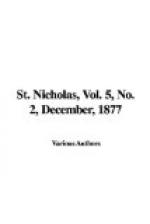His cheeks were plump, his eyes were bright,
He stepped as light
As a camel might,
And bounced and played from morn till
night.
And whether he was here or there,
His parents’ care—
Unseen like air—
Followed and held him everywhere.
[Illustration: “HE WOULD JUMP ON THE CARS TO RIDE.”]
He really was their joy and pride—
Was good beside;
But woe betide—
He would jump on the cars to ride!
There, hanging to a brake or step,
Tight hold he kept,
And onward swept,
Yelling with all his might, “Git-tep!”
Dunn’s father learned that he did
so,
And told him to
Decline to go
Where trains were running to and fro.
As for his mother, she turned white,
And gasped with fright
To think Dunn might
Come home a pancake some fine night!
[Illustration: “HIS FATHER’S STERN COMMAND.”]
But his relations often said,
With shaking head,
That boy was led
To have his way if it killed him dead!
[Illustration: “THE FREIGHT-CARS DECKED WITH BOYS DID SLIDE.”]
And sure enough when school was out,
And boys about
The trains flocked out,
Dunn followed too, with plunge and shout.
He did not mean to grab a ride,
But by his side,
With tempting glide,
The freight-cars decked with boys did
slide!
Where was his father’s stern command?
Out went his hand;
He gained a stand—
At least he planned to gain a stand!
What is it? Crash! His head
is blind!
That wheel behind—
He hears it grind!
And he is paralyzed in mind!
On cork and crutches now goes Dunn!
Whole boys may run—
Grab rides for fun—
But, as I said, this boy is Dunn!
THE TOWER-MOUNTAIN
BY GUSTAVUS FRANKENSTEIN.
I.
Many years ago, I was roving in a land strange and wonderful to me. It was a tropical country, and I was wandering alone among the grand scenery of the mountains, and the luxuriant vegetation of the hill-sides and valleys.
I had with me but few implements, and these, such as were light and easy to carry. A hunting-knife, a small hatchet, a canteen and a few marching necessaries made up my kit.
One day while rambling about, living on the bountiful supplies of fruit nature provides in that charming region, I came to a deep lake surrounded by steep hills. On the opposite side of this lake I could see a narrow gap or cleft, which seemed to lead to the higher ground. I therefore made a raft,—not without considerable trouble,—and paddled it across the lake. I found the gap quite narrow at its entrance, but it soon became wider, while far forward, at the end of the chasm, there appeared to be a series of rude steps.




